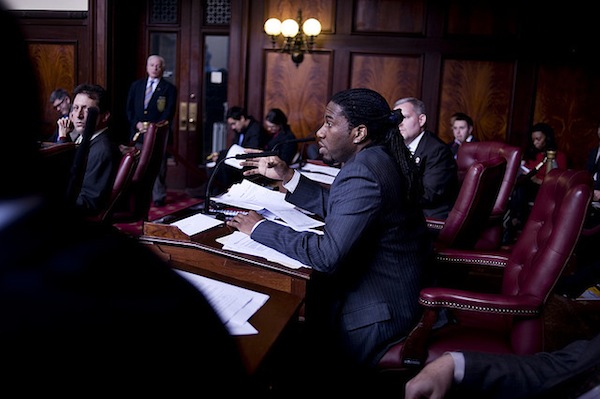
Photo by: NYC Council
Brooklyn Councilman Jumaane Williams was one of the prime sponsors of the new bill.
Landlords found guilty of harassment will face increased penalties under revamped legislation signed by Mayor de Blasio on Tuesday, but some tenant advocates say the bill may not curb increasingly aggressive attempts by landlords to push out low-income renters.
The Council voted 49-0 last week to amend the Tenant Protection Act, which was signed into law in 2008, by Mayor Michael Bloomberg. The bill will double maximum fines to $10,000. Harassing landlords would also find themselves on a list compiled by the Department of Housing Preservation and Development (HPD), which will be published on the agency’s website.
The legislation, sponsored by Councilmembers Margaret Chin and Jumaane Williams, will also set a $1,000 minimum fine per apartment for a first offense, increasing to $2,000 for repeated offenses within five years.
Actions deemed harassment under the act include denial of repairs or services, verbal or physical abuse, frivolous court actions and entering a tenant’s apartment without prior notice.
Rachel Hannaford, an attorney with South Brooklyn Legal Services, praises the Council move as a positive step, but says that tenant harassment has gotten worse since the act was first passed in part because fines are rarely handed down by housing-court judges.
“The law is not a deterrent. Tenants don’t know about it and the courts have not been very aggressive in issuing decisions in finding harassment and ordering penalties,” she says.
AnnMarie Santiago, an associate commissioner for HPD, told a Council hearing in April that of the 3,206 cases brought since the act was passed, the majority (2,195) were discontinued, dismissed or withdrawn. Another 680 cases were settled, without the landlord admitting culpability.
She told the hearing that only 44 cases led to judgments against landlords and noted that “judges are less likely to impose these higher civil penalties, especially on landlords of small buildings.”
Why do judges in housing court rarely impose civil penalties against landlords found guilty of harassment? Possible explanations vary but they include case overload and “institutional pressure to settle,” says Sam Himmelstein, a tenant lawyer, who called on judges to be “more willing to issue fines.” He also wants any fines levied to go to the tenant who initiated the action, not the city.
While Hannaford calls the new fine “substantial” because it affects smaller landlords, Rosalind Black with Manhattan Legal Services says it’s not nearly enough. Calling tenant harassment a “huge problem” citywide, she adds, “For landlords, a fine of $10,000 can be merely the relatively small cost of doing business.”
Whether or not the fine is a deterrent for landlords, having to go to housing court to seek imposition of such a fine is certainly a deterrent for tenants, advocates say. Some renters may accept buyouts rather than fight. It’s nearly impossible to know how many tenants vacated their apartments because of harassment.
Landlords and their attorneys can also play an extensive game of cat and mouse, dragging on proceedings and forcing tenants to take time off work to attend housing court, which can be a costly gamble, Himmelstein says. Many tenants cannot afford legal assistance in their housing court fights.
Typically, he says, landlords who settle cease the harassment, except for the “really crazy ones.” But tenant lawyer Mary McCune is working with a disabled client who must return to court because the landlord is not complying with a stipulation ordering repairs. McCune says. The client has gone several months this year without gas.
A representative of the Rent Stabilization Association told the Daily News that the landlord lobby group opposed the new law because “there’s already 12 laws on the books dealing the harassment of tenants,” adding:
“There’s two sides to the story and oftentimes there’s a legitimate reason why something in a building may not be 100 percent correct. That doesn’t mean it’s harassment.”
The biggest problem with anti-harassment laws, McCune says, is that “most tenants don’t know about them, don’t know they can start a court case, and don’t know how to document their case.”
And as long as “the financial consequences for harassment do not outweigh the incentives, some landlords will continue to engage in harassment,” she says. The only way to really force landlords to obey the law would be to freeze or reduce rents when a case of harassment is documented.
“It is very hard for an individual tenant to prove a harassment case if it involves harassment other than a failure to make repairs. The best way to stop harassment is to educate and organize tenants,” she says.
Tenants can register complaints about harassment by calling 311.







